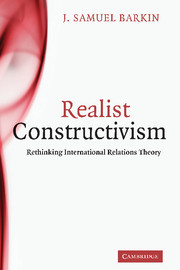7 - Agency
Published online by Cambridge University Press: 05 June 2012
Summary
The past three chapters have been devoted to discussing the inherently social aspects of both constructivism and realism. Yet at the same time there has been some discussion of the limits of focusing purely on the social. Chapter 4 noted that a focus only on a “logic of appropriateness” allows no more scope for change in patterns of international politics than does Waltz's transhistorical approach. And I have claimed in a number of places in previous chapters that the co-constitution of social structure and agents is a core concept of constructivism. Why the focus on the structure end of the agent–structure dialectic, and the relative absence of discussion of the role of agency?
Because you can theorize structure. But you can't theorize agency.
Or, to be more precise, within the context of the constructivist approach to international relations theory, one cannot reasonably make the sort of general statements about agents that one can about social structures. In other words, you can't theorize agency as agency is understood in constructivist logic. By general statements I do not refer to transhistorical ones, such as the neorealist claim that states in anarchy will always threaten each other. Rather, I refer to generalizations grounded in specific historical contexts – for example, the generalization that the norm of diplomatic immunity is widely subjectified in contemporary international politics, and therefore will continue to be respected most of the time in the near future.
- Type
- Chapter
- Information
- Realist ConstructivismRethinking International Relations Theory, pp. 100 - 117Publisher: Cambridge University PressPrint publication year: 2010

